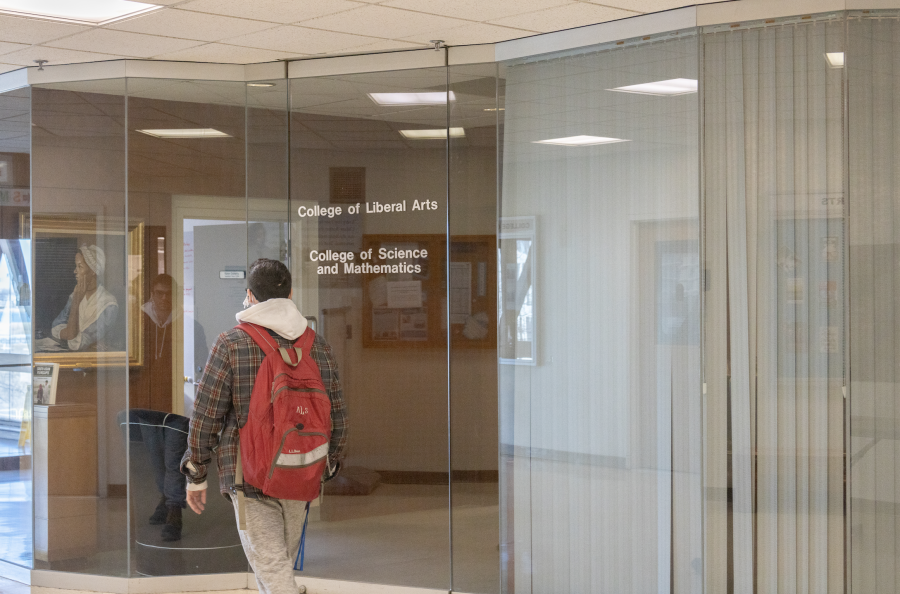The College of Liberal Arts at UMass Boston is anticipating an academic reorganization. The reorganization will potentially move the three largest CLA departments—Political Science, Economics and Sociology—to the McCormack Graduate School of Policy and Global Studies. This academic reorganization intends to eliminate the existing imbalances between colleges and achieve four key dimensions: undergraduate education, graduate education, research and scholarship, and community engagement.
In order to analyze the idea of academic reorganization and make recommendations to the Provost, the Academic Reorganization Task Force was formulated in 2020 under the leadership of former Interim Provost Emily McDermott. The ART constitutes faculty, staff, administrators and so on. Under the guidance of McDermott, ART was primarily commissioned to suggest the reorganization plans for two colleges, the School for the Environment and the McCormack Graduate School of Policy Studies. After McDermont, Joseph Berger took charge as a provost and made amendments to the tasks previously laid out for the ART.
The ART was then charged with looking into broad, plausible scenarios and establishing the groundwork for academic reorganization that would not limit options to only two colleges, SFE and MGS. The ART finished its report in April 2021, delivering all feasible scenarios with the “trade-offs associated with each scenario,” as directed by Provost Berger. After the presentation of the final report, Berger initiated the consulting process where he took the inputs from the department chairs, faculty and, apparently, from students.
The final report presented by the ART outlined five reorganization scenarios: Creating a University College, creating a School of Graduate Studies, the As-Is scenario, creating a College of Engineering and creating a transdisciplinary College that combines the School for the Environment and McCormack Graduate School into one unit.
After further consultation and deliberation, the list of scenarios was condensed to two popular options, either creating a new McCormack College or the As-Is scenario, meaning retaining the status quo. The ART also presented nine other ideas alongside these five reorganization scenarios. The ideas include a School for the Environment standalone, moving MGS into the College of Liberal Arts, creating a University College with the Honors College incorporated as a program, et cetera.
The first scenario of building the New McCormack College would lead to integrating the three departments from CLA to McCormack Graduate School’s Department of Conflict Resolution, Human Security and Global Governance, and the Department of Public Policy and Public Affairs. These five departments, along with some centers and institutes, will potentially offer and expand undergraduate programs under these departments. New appointments and tasks will accompany this scenario, including formulating a new constitution and by-laws for the new college, initiating a search for a permanent position of dean of New McCormack College, hiring new faculty and facilitating a smooth transition of the current faculty from CLA. The relocation and creation of a new administrative structure under the new college would inevitably be coupled with other logistical challenges.
Although there have been conflicting reactions to the idea of reorganizing as a whole, the Provost provided some clarifications and answered some of our questions. One of the crucial questions was concerned with the purpose of the reorganization plan. Many believe it is motivated by budgetary and monetary considerations, but Berger underlined that the decision is not primarily motivated by financial considerations. However, it is one of the factors in deciding the best strategy to balance and manage educational resources.
Berger emphasized the two popular scenarios that are strongly considered at the moment and added that regardless of whichever path the administration may take, there will be some trade-offs.
There have been some opposition and mixed reactions to the proposed idea. However, when asked about some immediate challenges faced by the students of the three departments during the transition, Berger said that he had thoughtfully considered the direct implications and tried his best to look for an option with a seamless transition. He further added that regardless of the college structures, we will have to find ways that “engage in processes that help us sort of build better connections.”
When asked about the faculty and the Task Force’s reaction to the plan of creating a new college, Berger said that people are often wary about change. In the process, we might lose the opportunity to build and make something that would benefit the campus, not just at present but in the future. “There are things we need to change in order to improve this campus no matter what,” said Berger.
Berger has been consulting and talking with groups of people to take their input. He has been in conversation with the Deans of colleges, department chairs, faculty, members of the faculty union, and more. Commenting on the timeline of implementing any proposal, Berger said that the administration would have the best scenario in place by September 2023. Although this timeline is set for now, Berger stated there would be a lot of work involved in setting up the process and structure. In his opinion, “uncertainty is stressful,” but he is open to talking with people to discuss the timeline as the administration moves forward.
Finally, there is some skepticism about carrying out the entire reorganization plan. When asked about the people’s engagement in the decision-making process, Berger commented, “So ultimately it is my decision as Provost, right? And you know, it is not a decision I take lightly, but it is also informed by the academic reorganization task force that had representatives from all schools and colleges on this campus.”
The story is still developing for the readers, and we anticipate updates and further inputs from faculty and students on the reorganization plan.
What exactly is the academic reorganization about?
January 27, 2023
Students passing by the CLA Dean’s office in Wheatley. Photo by Hunter Berry / Mass Media Staff





















































